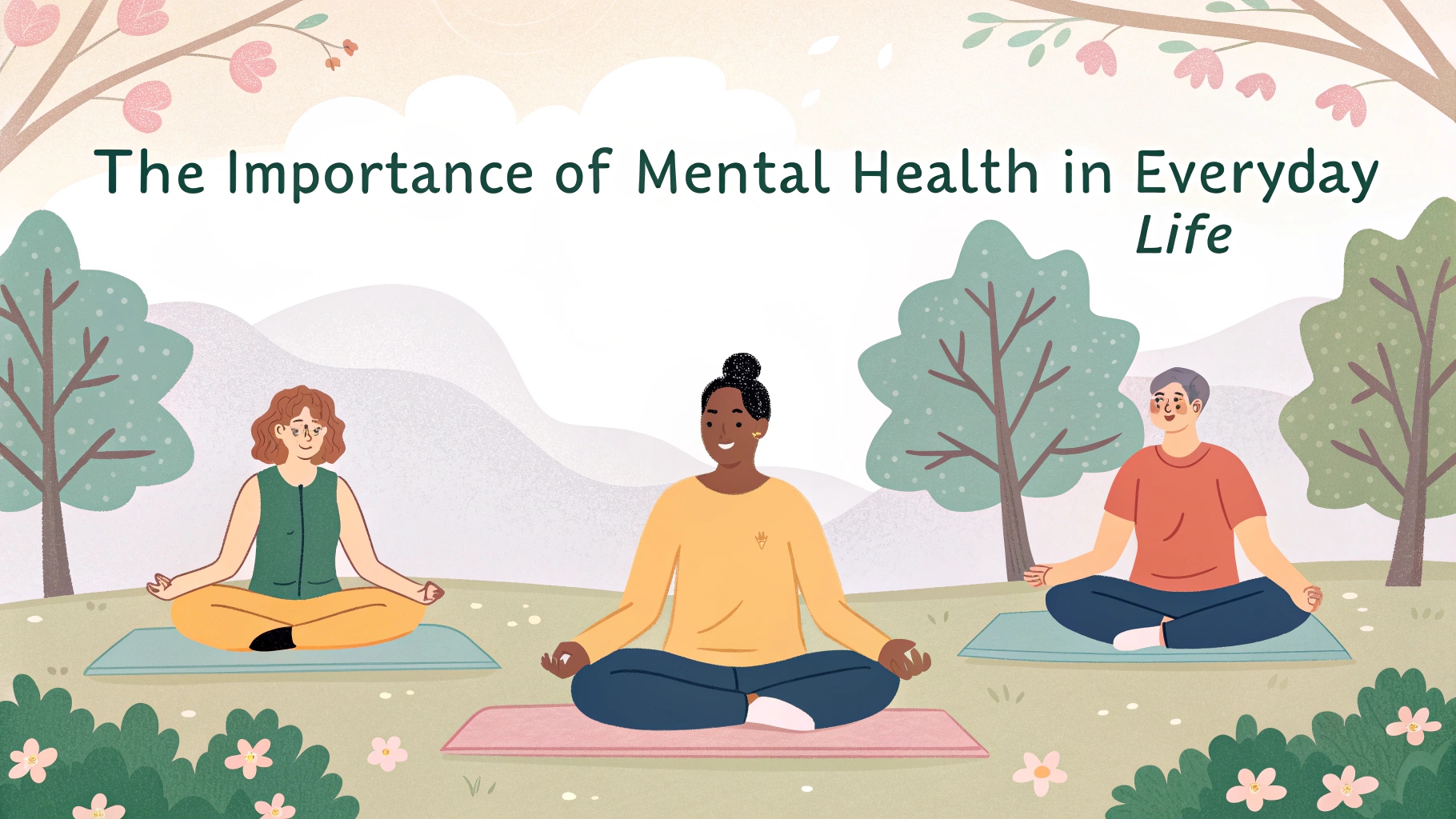The Importance of Mental Health in Everyday Life
Introduction
In today’s fast-paced world, many people are constantly juggling responsibilities, managing stress, and striving to achieve personal and professional goals. Amidst all this, one essential aspect of overall well-being often goes unnoticed—mental health. While physical health has long been emphasized, it is equally crucial to understand that a sound mind directly influences how we think, act, and interact with others. Our emotions, behaviors, and daily choices are all shaped by the stability of our inner world. This article explores why mental wellness matters in everyday life, how it impacts various aspects of human existence, and what steps can be taken to maintain balance.
The Connection Between Mind and Body
The human mind and body are deeply interconnected. When someone experiences anxiety, stress, or depression, it can trigger physical symptoms such as headaches, fatigue, or even chronic illnesses. Conversely, maintaining emotional stability often boosts physical resilience. For instance, individuals with a positive outlook tend to recover faster from medical procedures and respond better to treatments. This interplay highlights that nurturing mental health is not just about avoiding stress but about fostering harmony between mind and body to ensure complete well-being.
Mental Well-Being and Daily Productivity
A strong mental state plays a significant role in productivity. Whether at work, school, or home, focus and motivation depend largely on emotional balance. People struggling with unresolved stress or burnout often find it challenging to meet deadlines or perform efficiently. On the other hand, when someone feels emotionally secure, they are more creative, motivated, and capable of problem-solving. Employers today increasingly recognize this fact, leading many organizations to introduce wellness programs that encourage counseling, meditation sessions, and work-life balance strategies. Prioritizing mental stability in professional life benefits not only individuals but also businesses through improved performance and reduced absenteeism.
Relationships and Emotional Balance
Human beings are social creatures, and meaningful relationships are at the core of happiness. Good communication, trust, and empathy are all outcomes of emotional balance. When an individual is mentally strong, they are more patient and understanding with their family, friends, and colleagues. On the contrary, prolonged stress or anxiety can lead to conflicts, social withdrawal, or misunderstandings. Strengthening mental health ensures that people can engage positively in relationships, resolve disputes more effectively, and create stronger connections with those around them. In this way, emotional stability nurtures the social fabric that supports everyday life.
Table of Contents
The Impact on Physical Lifestyle Choices
Mental wellness greatly affects the choices we make about our physical health. For example, people experiencing emotional stress may resort to unhealthy habits such as overeating, smoking, or alcohol consumption as coping mechanisms. Conversely, a balanced state of mind encourages healthier routines like exercising, eating nutritious meals, and getting adequate sleep. Studies consistently show that individuals who prioritize their mental health are more consistent in maintaining active lifestyles, which in turn lowers the risk of cardiovascular diseases, obesity, and other chronic illnesses. Thus, cultivating emotional balance indirectly enhances overall physical well-being.
Breaking the Stigma Around Mental Wellness
Despite its importance, discussions around emotional well-being are often accompanied by stigma. Many people hesitate to seek help due to fear of being judged or misunderstood. This silence can worsen conditions, leaving individuals to suffer unnecessarily. Raising awareness about the value of mental health is essential for breaking this cycle. Schools, workplaces, and communities need to encourage open conversations and normalize the idea that seeking therapy or counseling is no different from visiting a doctor for physical issues. When society collectively reduces the stigma, individuals feel more empowered to address their struggles without shame.
Mental Wellness Across Different Life Stages
At every stage of life, the state of our emotions plays a distinct role. For children, developing emotional resilience helps them cope with school pressures and social interactions. Teenagers benefit from guidance as they navigate identity, peer influence, and academic stress. Adults face responsibilities of careers, families, and finances, where balance becomes essential for decision-making and stability. For older adults, maintaining strong mental health is vital for coping with aging, loneliness, and physical decline. Recognizing the unique needs of each stage ensures that emotional care remains a lifelong priority.
The Role of Self-Care in Everyday Balance
Self-care is one of the most effective ways to support mental wellness. This doesn’t just mean indulging in luxury activities; it includes everyday habits such as practicing mindfulness, setting healthy boundaries, engaging in hobbies, and ensuring adequate rest. Even small practices like journaling or spending time in nature mental health can bring a sense of calm. Making time for personal well-being should not be seen as selfish but as necessary. When individuals care for themselves, they are better equipped to handle challenges, care for others, and contribute positively to society.
Seeking Professional Help
Just as physical health sometimes requires medical treatment, emotional well-being may need professional intervention. Therapists, psychologists, and counselors provide valuable support through techniques such as cognitive-behavioral therapy, stress management strategies, and coping mechanisms tailored to mental health each person. Many individuals feel relief simply by sharing their struggles with a trained professional who can offer a non-judgmental perspective. In severe cases, medical treatments and medication may also be necessary. Seeking professional help should always be considered a strength, not a weakness, because it demonstrates courage in addressing underlying issues.
The Global Relevance of Mental Wellness
Mental health is not confined to any culture, country, or economic class—it is a universal human concern. In fact, the World Health Organization emphasizes that emotional well-being is a fundamental component of overall health. Across the globe, increasing numbers of people are facing stress due to rapid urbanization, financial struggles, and social changes. As societies evolve, governments and institutions must make mental wellness an integral part of healthcare systems, ensuring that support is accessible to all. By treating emotional health as a global priority, humanity can foster more resilient and compassionate communities.
Strategies for Strengthening Emotional Well-Being
There are many practical strategies that individuals can adopt to maintain balance in everyday life:
Regular Exercise: Physical activity releases endorphins that reduce stress.
Mindfulness and Meditation: Techniques such as deep breathing and meditation calm the mind.
Healthy Social Connections: Surrounding oneself with supportive people provides encouragement.
Adequate Sleep: Proper rest ensures mental clarity and emotional stability.
Limiting Screen Time: Reducing digital overload allows the brain to recharge.
Setting Goals: Having achievable goals creates purpose and motivation.
By consistently practicing these methods, people can build resilience and protect themselves from long-term emotional struggles.
Conclusion
The importance of mental health in everyday life cannot be overstated. It influences how we think, feel, and behave, shaping every aspect of human existence—from physical well-being and productivity to relationships and lifestyle choices. Breaking the stigma, promoting open dialogue, and prioritizing self-care are crucial steps toward creating a society where emotional wellness is valued just as much as physical health. When individuals and communities invest in their mental stability, they not only improve their quality of life but also contribute to a more compassionate, balanced, and productive world.



